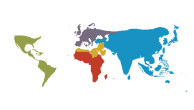
Government Restrictions on Religion Stayed at Peak Levels Globally in 2022
Our annual report includes a five-year look at the relationship between religion-related government restrictions and social hostilities in 198 countries and territories.
- Interactive: Religious Restrictions Around the World









